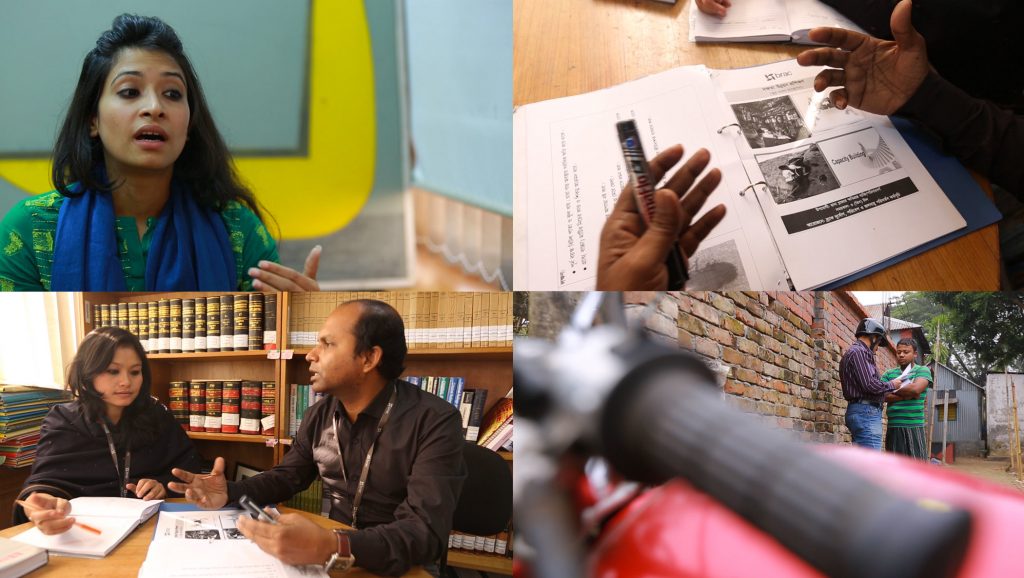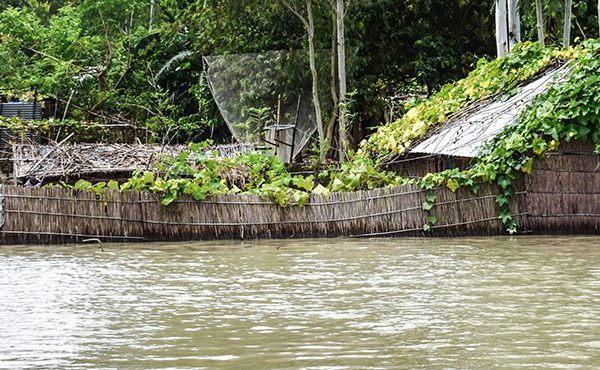Reading Time: 3 minutes
“I had never seen such a large-scale calamity before,” said Puja Gloria Rodrigues, psychosocial counsellor from BRAC University’s Institute of Educational Development (IED). Three days after the Rana Plaza collapse, she arrived at the National Institute of Traumatology and Orthopaedics Rehabilitation (NITOR) in Dhaka along with a group of counsellors.

“I had never seen such a large-scale calamity before,” said Puja Gloria Rodrigues, psychosocial counsellor from BRAC University’s Institute of Educational Development (IED). Three days after the Rana Plaza collapse, she arrived at the National Institute of Traumatology and Orthopaedics Rehabilitation (NITOR) in Dhaka along with a group of counsellors. There the team visited each of the injured, offering them emotional support. Witnessing the trauma being experienced by the survivors made a huge impact on those working to help them. “I was in shock,” said Puja. “It was extremely difficult to see the people in such pain and suffering.”
For Puja and others who went on to provide further psychosocial counselling, the task of addressing survivors’ suffering – beyond the physical implications – posed another huge challenge. Many were still afraid to enter a building or would panic upon hearing any sudden, loud noise. “Getting them to start talking about their feelings was difficult, because the survivors were aware of the social stigma associated with their situation,” explained Puja. In Bangladesh, where issues of psychosocial trauma are hardly acknowledged, those who are suffering are less likely to be comfortable with trauma counselling. Breaking down these barriers was a crucial part of efforts to help them cope and move forward.
As part of a project developed in collaboration with Benetton Group, BRAC set out to help survivors find new ways to earn a living and support themselves and their families. The first step in this project, surveying survivors as well as families of the deceased, required very careful administration. Md Tozammel Haque, branch manager of BRAC’s microfinance office in Savar, led the initial survey with his team. Since it was carried out door-to-door, several locals who had not been present on the day of the tragedy eagerly arrived to try and claim financial assistance to which they were not entitled. Previous employees of Rana Plaza began coming forward, showing their former work identity cards so as to be included in the survey. Complicating things further, surveyors were approached by mastans (local goons) looking to act as middlemen between the organisation and potential project participants. But Tozammel and his team stood their ground, refusing to give into their demands. “We didn’t let them stand in the way as we helped people,” he said.
Since skill development training was also a part of this project, a major challenge was to integrate financial support with the training itself and create a comprehensive programme, which could prepare participants for a fresh start. “We had never given this sort of training to survivors of manmade disasters,” explained Ratan Chandra Biswas, senior sector specialist at BRAC’s disaster, environment and climate change programme. “So we had to take their level of physical and psychosocial trauma into consideration during planning.” Stressful or high-pressure scenarios were to be avoided by all means necessary.
Other problems loomed. For example, when time came to initiate their new businesses, those who chose to set up grocery stores called Tozammel mentioning that they were unable to find space to set up their shops. Most landlords with available rental space would not allocate it without an initial deposit, which many project participants could not afford to pay. Tozammel found that personally communicating with the landlords helped shed light on their participants’ financial limitations. As a result, several landlords decreased the deposit by half or didn’t ask for one atall. Additionally, to start their businesses, the new shop owners required various items for their stores. “With the seed funding provided by the project, we helped them buy items to stock their stores with,” said Tozammel. Even though it was a very lengthy and tiresome process, staff stood by the project participants every step of the way, helping them eventually overcome the trauma and ensuring an effective start to their new lives.
Over some time, BRAC and Benetton Group has been showcasing the experiences of those helped and their journey of recovery. Below are the stories of the BRAC staff that helped on the frontlines.
https://www.youtube.com/watch?v=HfaHBhLrIW4
Anushka Zafar is senior communications officer at BRAC Communications.





